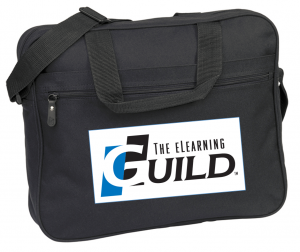What’s in Your Conference Bag? – JD Dillon
Welcome to a TWIST Blog Series – What’s in Your Conference Bag? This series explores the various ways people prepare for and get more out of a conference. Each week we’ll feature a new Learning and Development Professional who will answer a series of questions and share his or her personal tips for maximizing a conference experience.
 This week’s guest is JD Dillon, Director of Learning Technology and Development with Kaplan Higher Education Group, where he works with employees and leaders in call centers and campuses across the organization to help them learn and improve their performance. JD also wrote a recap of the Ecosystem 2014 Conference for TWIST earlier this month.
This week’s guest is JD Dillon, Director of Learning Technology and Development with Kaplan Higher Education Group, where he works with employees and leaders in call centers and campuses across the organization to help them learn and improve their performance. JD also wrote a recap of the Ecosystem 2014 Conference for TWIST earlier this month.
What you do: My title is Director – Learning Technology & Development with Kaplan Higher Education Group. What I REALLY do is partner with my L&D peers and organizational leaders to support our employees through the effective application of workplace learning technology and instructional content. I also lead a virtual team of designers/developers, admin a few systems, consult on process improvements, and share my thoughts on all things L&D at justcuriousblog.com and on Twitter – @JD_Dillon.
Where you do what you do: I split my time between my ‘real’ office, home office, and various restaurants with wifi around Orlando, Florida.
Something most people don’t know about you: I can recite every word of dialogue from Back to the Future. Oh, and I can juggle.
One word that describes why you attend conferences: Sharing
Besides the conference-provided materials, what types of things do you carry in your conference bag?
I try to travel light during events, so I ditch most of the provided materials (and the sponsor bag) almost immediately after registration. In my personal shoulder bag, I have my …
- iPhone
- iPad
- Mophie battery charger with multiple iDevice cables
- Earbuds
- Business cards
- 1 black pen
What types of things do you do BEFORE a conference to plan and get more out of the experience?
I find the key to a great conference experience is doing the necessary pre-work, like …
- Setting up my session schedule so I include a first, second, and (if available based on interest) third choice for each timeslot
- Reviewing attendee and speaker lists so I can determine who I may want to meet or catch up with (made a few Twitter friend bingo cards in the past)
- Researching local restaurants and entertainment offerings (for after-hours stuff)
- Sharing my plans with my PLN so we can find mutual interests and meet-up times
- Trying to get some topical conversation going around the conference using hashtags on Twitter
What about AFTER a conference? What do you do to keep the learning going after the conference ends?
I always do three essential things …
- Reflect – I schedule time to go back into my notes, materials, and Twitter stream and reflect on the conference experience. With the event completed and travel done with, I can think about everything within the context of the entire experience.
- Write – Once I have my ideas organized, I expound on them in writing. Some of this writing includes personal notes and strategies, but the majority is shared publicly through blog posts and Twitter to generate conversation and added sharing.
- Act – I try to find at least one actionable idea that I can integrate into my work almost immediately.
What apps/tools/resources help you get the most out of a conference? (It doesn’t have to be technology)
- iPhone – I do 90% of my research, planning, and sharing via iPhone
- Twitter – I take most of my notes publicly via tweets that I reflect on later. I also use Twitter to engage in active conversation with other attendees and catch up with contacts during the event.
- Evernote – This is where I keep my more detailed or private notes.
- Camera – Quick snapshots of slides and friends are always nice to look back on.
- Google Maps – I wouldn’t find anything interesting outside the conference without it.
- Open Table – I always try to experience a nice meal or two in the local area.
- Google Hangout – If I need to catch up with someone at work, I can trigger a quick Hangout on the spot.
- Backchannel – These curated resources updated throughout the conference take the pressure off and help me avoid running around to attend every session that sounds interesting. I can always check for shared notes later.
Do you prefer to use a paper program guide for a conference or a dedicated conference app? Why?
Always the app, as long as it’s halfway decent. If I can track my session schedule and room locations via the app, I never look at the paper guide. However, I still carry it with me for at least the first day as a backup.
When traveling to and from a conference, how do you pass the time?
I do my best to disconnect from my typical work during conference trips. Therefore, I’ll try to use the transit time to catch up on other professional activities, including reading and blogging.
 What’s the most important thing you look to take away from a conference experience?
What’s the most important thing you look to take away from a conference experience?
New and improved relationships – conferences are much more about the people I spend time with and less the sessions and scheduled events.
What topics are you most interested in right now?
User-generated content – I believe L&D has a prime opportunity to leverage social and curation technologies to help people share what they do and transform tacit information into valuable reference and learning material.
You’ve also been a speaker at conferences – What was it that first motivated you to speak at a conference?
My network on Twitter inspired me to start submitting proposals. Interacting with L&D professionals from around the world helped me to better understand what I had to share with the community based on my knowledge, experience, and ideas.
If you could give one piece of advice to someone attending a conference for the first time, what would it be?
Don’t try to do everything to “get your money’s worth.” Identify your must-dos before you arrive, but make time to wander around and engage random people in conversation.
Does your employer financially support your attendance at a conference? If yes, how did you persuade your boss to approve you attending?
In the past, this was an easy sell. Now, with less resources available for professional development for the entire organization, I have to find direct connections between my work, organizational priorities, and the conference offering to justify my requested expenses. It also sends a powerful message when I reiterate that I am willing to pay for some or all of the expense if I am not supported.
Interested in being a guest for a future “What’s in Your Conference Bag post? Please reach out to David Kelly for details.

Leave a Reply to What’s in my conference bag nowdays? – LearnGeek Cancel reply